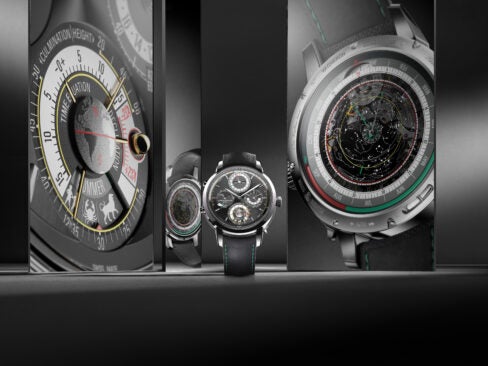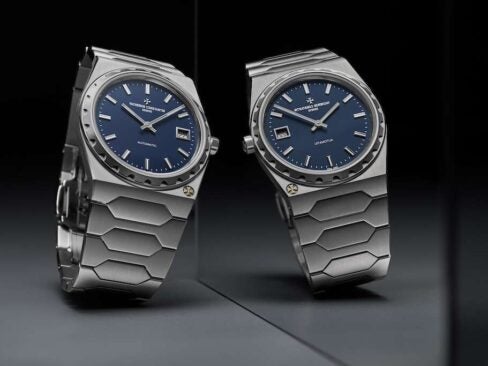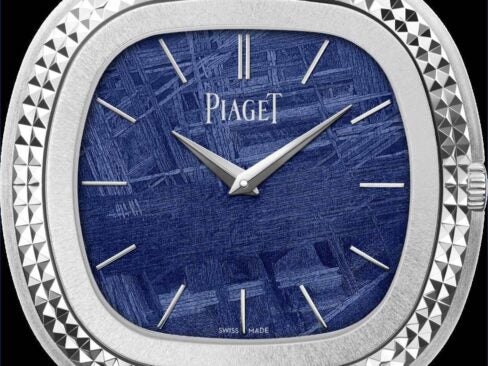The 14th Edition of the Grand Prix D’Horlogerie de Geneve is under way, and this year no less than 72 pre selected watches will be running to win the “Aiguille d’Or” Grand Prix.
With this year’s GPHG attracting record participation, all major watch groups are being represented, along with a number of independent companies.
Vote for your favorite amongst the following pre-selected watches and automatically participate in the drawing to win a Girard – Perregaux Vintage 1945 XXL Petite Seconde, worth $11372.29.
Here are the six finalists in the Calender category. Tomorrow we will be revealing the Striking category.
 A. LANGE & SÖHNE, RICHARD LANGE PERPETUAL CALENDAR “TERRALUNA”
A. LANGE & SÖHNE, RICHARD LANGE PERPETUAL CALENDAR “TERRALUNA”
The RICHARD LANGE PERPETUAL CALENDAR “Terraluna” is a horological masterpiece that combines A. Lange & Söhne’s benchmark precision, inventiveness, and design competence. Featuring an orbital moon-phase display, a perpetual calendar with the Lange outsize date, a power-reserve of 14 days, and a constant-force escape- ment, this extraordinary time-keeping instrument represents the pinnacle of Saxon watchmaking artistry.
The RICHARD LANGE PERPETUAL CALENDAR “Terraluna” is equally impressive on both sides. On the dial side of the 45.5-millimetre pink- or white-gold case, the watch stands out with the regulator layout of scientific precision watches. The movement side presents an innovative and useful orbital moon-phase display that depicts the constellation of the earth, moon, and sun.
The large minute circle is at the top of the dial of the RICHARD LANGE PERPETUAL CALENDAR “Terraluna”. The smaller dials for the hours and seconds are beneath it, shifted toward the right and left. As was already the case with the RICHARD LANGE TOURBILLON “Pour le Mérite” presented in 2011, this dial design was inspired by a great historic role model: Johann Heinrich Seyffert’s 1807 regulator from the world-famous timepiece collection of the Mathematics and Physics Salon. With his ingenious designs, Seyffert helped transform Dresden into a hub of precision horology in the early 19th century. A great advantage in precision pocket watches, the regulator format was appreciated not only by time-keeping services and observatories, but also by watchmaking manufactories where it was used for synchronising new timepieces. This is because it provided an accurate display of the minutes and seconds.
Breguet watches convey the passage of time in the most considerate way. It is thus quite natural for the company to apply its expertise to extend the usual hours, minutes and seconds of the day to the days themselves, and to the dates, months and years. Since its beginnings, Breguet has produced a number of perpetual calendar models, each as complex as it is fascinating. Today as in the past, the manufacturer’s code means that it can never be satisfied with what already exists and decrees that it must modernise in technique and design.
Although the Classique collection already includes several perpetual calendar models, Breguet’s watchmakers set about creating a new version, the reference 3797. In it, they have paid particular attention to the styling for a more intuitive display of the indications without compromising the charm of the watch. The amount of information displayed on the dial can be confusing, so Breguet has added a third dimension. By lifting the hours and minutes chapter to the foreground, the timepiece draws attention to the essential information. A further glance takes in all the other indications. The reference 3797 does this with an offset sapphire disc. The opaque chapter ring with its metallic Roman numerals reveals the time instantly with the aid of the Breguet open-tipped hands in blued steel. Beneath the disc, an engine-turned hobnail pattern decorates the dial, overarched by the semi-circular scale of the retrograde dates.
The one-minute tourbillon at 6 o’clock nicely complements the chapter ring. Its bridge is delicately chamfered and surmounted by a triple hand for the seconds. The subdial for the days at 9 o’clock is engine turned in waves. In the movement, a snail cam makes the days hand jump instantaneously. At 3 o’clock a blued steel hand points to the months on a dial engine-turned in a shimmering sunburst pattern. At its centre a blue sun shows the leap years.
At the back of the watch, a sapphire-crystal glass reveals the movement and the way the baseplate has been designed to throw the maximum light onto the tourbillon. Once again, the talents and experience of Breguet’s craftsmen and women were applied to achieve these remarkable decorations by hand. The engravings thus give life to a sumptuous trellis that seems to jump out of the movement, while the tourbillon’s ballet sets the tempo.
 JAQUET DROZ, PERPETUAL CALENDAR ECLIPSE IVORY ENAMEL
JAQUET DROZ, PERPETUAL CALENDAR ECLIPSE IVORY ENAMEL
The Perpetual Calendar Eclipse by Jaquet Droz presents a spectacular new moon phase display in two models with a resolutely modern design.
The Eclipse, a poetic masterpiece of Fine Watchmaking, is one of the brand’s most iconic timepieces. This year, Jaquet Droz craftsmen in La Chaux-de-Fonds masterfully paired the moon phase complication, which displays the fascinating cycles of the night of the sky on the dial, with the Perpetual Calendar: a finely orchestrated union which raises these two complications to a new level of elegance.
On the ivory-colored Grand Feu enamel dial, two straight hands contrast sharply with the curves of two wavy hands, tipped with a crescent moon. The calendar information is easily read on several places on the dial: on the right is the current date, on the left is the day of the week. At 12 o’clock, a single-hand counter indicates the month with the leap year appearing discreetly in a small window. At 6 o’clock, a ivory-colored onyx index moves across the face of a golden moon, revealing, and then concealing it until its total eclipse. The whole spectacle unfolds on a night sky boasting eight stars, the watchmaker’s favorite number.
The Jaquet Droz Perpetual Calendar Eclipse captivates and surprises with its innovative design and contemporary calendar display. The brilliant sparkle of the red gold hands, moon and stars creates a perfectly balanced contrast to the eternal solemnity of the dial in this exceptional timepiece worn by a black leather strap.
 MONTBLANC, MEISTERSTÜCK HERITAGE PERPETUAL CALENDAR
MONTBLANC, MEISTERSTÜCK HERITAGE PERPETUAL CALENDAR
Ninety years ago, Montblanc created a writing instrument that became an icon in the culture of writing: the Montblanc Meisterstück. With functional and aesthetic design, an innovative ink supply and a manually profiled gold nib, this fountain pen is the legendary writing instrument of our time.
The Montblanc Meisterstück Heritage Collection is inspired by the ninety-year heritage of the Meisterstück. With classical design, discriminating complications and sumptuous decorations, these elegant timepieces manifest the values of the Montblanc Meisterstück and the traditional features of fine Swiss watchmaking in every detail – thus making them their owners’ lifelong companions.
The grande complication of the perpetual calendar is both highly demanding from a mechanical viewpoint and an expression of the utmost in the watchmaker’s art. Unlike an ordinary “full calendar”, a perpetual calendar always shows the correct date and requires no manual adjustment, not even at the end of a month with fewer than 31 days and also not at the end of February in a leap year. It accordingly jumps directly from 30 June to 1 July and from 28 February to 1 March, except in a leap year, when it automatically shows 29 February. The mechanism which supports this function requires complexly shaped rockers and cams that mechanically pre-program the variously long months and also add a 29th day to February once every four years. If the mainspring of the Montblanc Meisterstück Heritage Perpetual Calendar is kept sufficiently wound, this timepiece’s calendar will require no manual adjustments until the year 2100. If this watch is left unworn for a longer period of time, its calendar displays can be quickly and easily returned to synchrony with the current date by pressing the inset buttons in the middle piece of the case. The perpetual calendar is powered by self-winding mechanical Calibre MB 29.15., which has a balance paced at 28,800 semi-oscillations per hour (4 hertz).
The displays of the Meisterstück Heritage Perpetual Calendar are harmoniously arranged on the dial: the date is shown at “3 o’clock”, the day of the week at “9 o’clock”, and the month at “12 o’clock”. On the inner scale of the month display, the leap-year cycle is shown by a blue triangle and a leap year is indicated by a red “4”. The moon’s phases are emulated in a window at “6 o’clock”; the moon’s age is indicated in days at this window’s upper edge. The calendar’s finely blued hands elegantly contrast with the silver-white, cambered dial, which is adorned with a sunburst pattern. A gold-plated hour-hand and minute-hand harmonize with the 39-mm-diameter case, which is crafted from 18 karat rose gold. A pane of sapphire crystal in the back offers a clear view of elaborately embellished self-winding Calibre MB 29.15. This new classic wristwatch is affixed to a black alligator-leather strap with an 18 karat rose gold pronged buckle. The closure’s curved crosspieces harmoniously repeat the curvature of the watch’s case. This too is another of the many details that distinguish timelessly perfect design in full accord with the traditions of haute horlogerie.
Each Montblanc Meisterstück Heritage Perpetual Calendar wristwatch is subjected to a comprehensive 500-hour quality test at the manufacture in Le Locle. Developed by Montblanc, this rigorous examination verifies the accuracy of the watch’s rate, the watertightness of its case, the timepiece’s overall performance and robustness, and the functionality of the individual displays. Only after its examiners are convinced that a watch upholds Montblanc’s strict quality standards do they release it for subsequent delivery. Each watch that passes the 500-hour test is individually issued a test certificate.
 VAN CLEEF & ARPELS, MIDNIGHT PLANETARIUM
VAN CLEEF & ARPELS, MIDNIGHT PLANETARIUM
For this 2014 edition of the SIHH, the Maison achieved its dream of reducing the scale of the heavens to the dimensions of a wristwatch. Six years after the launch of the Lady Arpels Jour Nuit model, it once again celebrates celestial orbits by drawing inspiration from the historic tradition of planetariums. Much in vogue in the 18th century, these objects provided a three-dimensional representation of the solar system and the movement of the planets around the sun. Ancestors of modern planetariums, they were animated by hand or using clockwork mechanisms of great complexity. Today, Van Cleef & Arpels revisits this idea in the light of its own poetic imagination: the Midnight Planétarium timepiece offers a means of immortalizing one’s own lucky day in the universe, while admiring the course of the planets.
This new Poetic Complication timepiece provides a miniature representation of the movement of six planets around the sun and their position at any given time. Earth and Mercury, Venus, Mars, Jupiter and Saturn – all visible from Earth with the naked eye – are set in motion thanks to a self-winding mechanical movement of great complexity: equipped with an exclusive module developed in partnership with the Maison Christiaan van der Klaauw, it contains 396 separate parts. The movement of each planet is true to its genuine length of orbit: it will take Saturn over 29 years to make a complete circuit of the dial, while Jupiter will take almost 12 years, Mars 687 days, Earth 365 days, Venus 224 days and Mercury 88 days. Telling the time is a simple question of observing the shooting star, a cherished lucky motif for the Maison. Located at the outer edge of the dial, it completes its circuit in 24 hours. The story continues on the back of the watch, where the oscillating weight is engraved with a starry composition. The day, month and year can be set using two push buttons and viewed through two apertures on the dial. These various functions are accompanied by a poetic invitation to celebrate one’s own lucky day. Using a rotating bezel, the watch’s owner can select the day of his choice by positioning a red triangle against a graduated calendar. On that date, the Earth will move to a position directly below the star engraved on the sapphire crystal, as a sign of good luck. Telling the time is a simple question of observing the shooting star, a cherished lucky motif for the Maison. Located at the outer edge of the dial, it completes its circuit in 24 hours. The story continues on the back of the watch, where the oscillating weight is engraved with a starry composition. The day, month and year can be set using two push buttons and viewed through two apertures on the dial. These various functions are accompanied by a poetic invitation to celebrate one’s own lucky day. Using a rotating bezel, the watch’s owner can select the day of his choice by positioning a red triangle against a graduated calendar. On that date, the Earth will move to a position directly below the star engraved on the sapphire crystal, as a sign of good luck.
The Maison has applied its jewelry-making expertise to depicting the planets with a selection of hard stones: turquoise for the Earth, serpentine for Mercury, chloromelanite for Venus, red jasper for Mars, blue agate for Jupiter and sugilite for Saturn. Intricately sculpted by hand into spheres of different dimensions and colors, they are positioned round a sun in pink gold. Each of these elements, along with the shooting star in pink gold, is fixed on its own aventurine disc. With their scintillating deep blue hue, the latter are arranged around the center in perfectly concentric alignment. Painstaking attention has been given to selecting the stones, then sculpting the discs and spheres in order to give form to this animated tableau, with its combination of jewelry and watchmaking savoir-faire.
 ZENITH, CAPTAIN WINSOR ANNUAL CALENDAR
ZENITH, CAPTAIN WINSOR ANNUAL CALENDAR
Stemming from fruitful cooperation between the Musée International d’Horlogerie (MIH) and the Manufacture Zenith, the Captain Winsor Annual Calendar Boutique Edition combines the most precise series-produced calibre with a complication that is both useful and innovative: the annual calendar. The creative mind behind it is none other than the curator of the Musée International d’Horlogerie (MIH) in La Chaux-de-Fonds, Ludwig Oechslin. This passionate enthusiast has designed an annual calendar displaying the day of the week, the date and the month, while requiring only one annual adjustment. This complication is intended to be more accessible than the perpetual calendar for a large number of chronograph lovers. In order to ensure excellent readability, this display is provided by three concentric discs. The outer disc indicates the date, the middle one the month, while the innermost disc shows the day of the week. The mechanism is both simple and complex: for 31-day months, the date disc moves the month disc forward, while for 30-day months, the month disc makes the date disc “skip” the 31st. Only the transition from February to March requires manual adjustment. Based on a clever and elegantly restrained construction, this complication comprises just nine mobile elements, whereas most calendars require between 30 and 40.
The mechanism powering this chronograph represents the ultimate expression of Zenith’s horlogical expertise: the high-precision El Primero movement, which has been produced within the Manufacture for over 40 years. El Primero is the only series-made movement to beat at a frequency of 36,000 vibrations per hour, meaning a rate of one beat every tenth of a second. The Captain Winsor Annual Calendar Boutique Edition houses the automatic El Primero Calibre 4054. This in-house movement, circular-grained and adorned with Côtes de Genève, is visible through the sapphire crystal case-back, itself surrounded by the engraved inscription “Captain – special edition”.
In its early days, the reputation of the Manufacture in Le Locle was notably built on the reliability of its marine chronometers, which served to calculate the position of ships at sea. It was this legendary era, this sense of adventure and of the high seas that Zenith wished to recapture in creating the Captain line in 1952. Representing a successful alliance between the knowledge and creative skills of two veritable watchmaking institutions, the Captain Winsor Annual Calendar Boutique Edition embodies an ingenious blend of user-friendliness and optimal readability.












